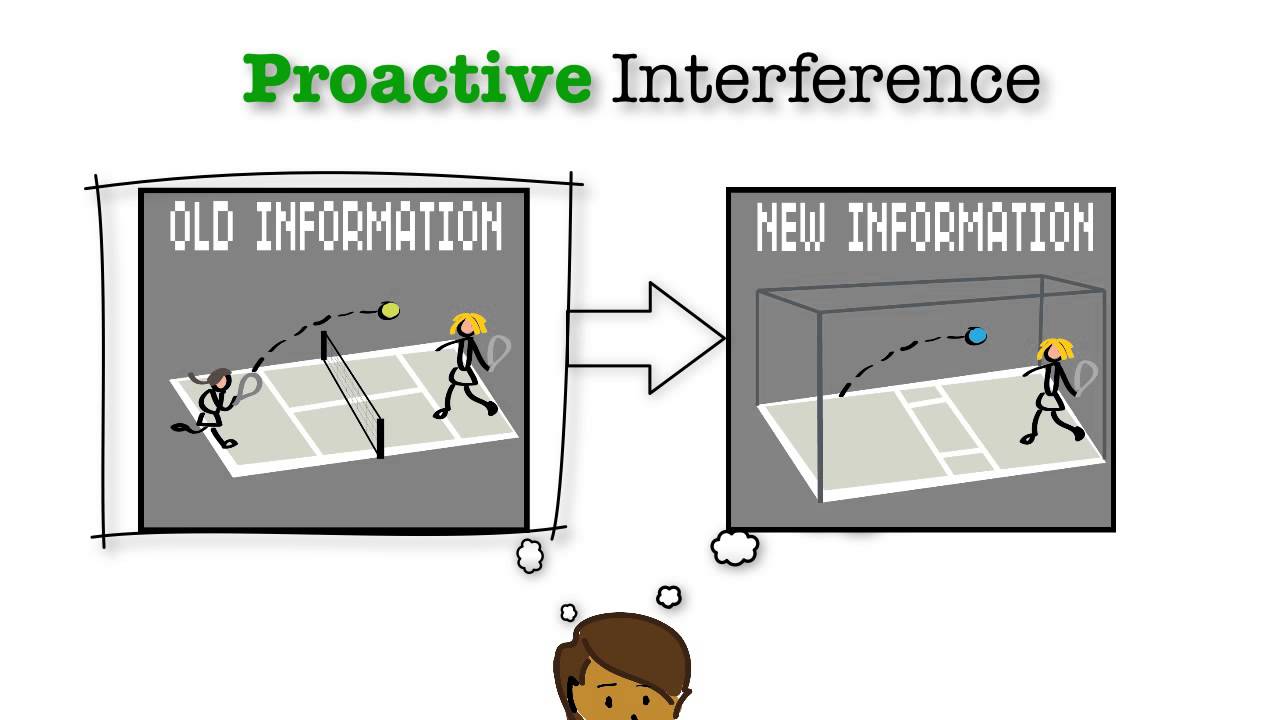Explanations for forgetting: Interference
1/14
There's no tags or description
Looks like no tags are added yet.
Name | Mastery | Learn | Test | Matching | Spaced |
|---|
No study sessions yet.
15 Terms
How does forgetting occur?
Due to interference
What is interference?
When two pieces of info disrupt each other, resulting in forgetting of one or both, or in some distortion of memory.
What is the interference theory?
Interference occurs largely in the LTM
Memories are still available, but we can’t access them as they are more difficult to locate due to interference, leading to forgetting
Interference is much more likely to occur if the memories are similar
What are the two types of interference?
Proactive and retroactive
What is proactive interference?
Occurs when an older memory interferes with a newer one
E.g. your teacher has learned so many names in the past that she had difficulty remembering the names of her current class

What is retroactive interference?
Occurs when a newer memory interferes with an older one
E.g. your teacher has learned so many new names this year that she has difficulty remembering the names of the students last year.
What did McGeogh and McDonald study?
Retroactive interference
Why did McGeogh and McDonald study this?
In both PI and RI, interference is worse when the memories are similar
What was the procedure of McGeogh and Mcdonalds study?
Learnt a list of 10 words to 100% accuracy. Then learnt a new list. 6 groups of participants each with a different new list:
Synonyms
Antonyms
Words unrelated to original
Consonant syllables
3 digit numbers
No new list, just rested (control condition)
What were the findings of McGeogh and Mcdonalds study?
The most similar material (synonyms) produced the worst recall.
What was the conclusion of McGeogh and McDonalds study?
Interference is strongest when the memories are similar.
What is a strength of the interference theory? (Baddeley and Hitch)
There is evidence of interference effects in more everyday situations.
Baddeley and Hitch asked rugby players to recall the names of the teams they had played against during a rugby season. The players all played for the same time intervals.
Players who played the most games (most interference for memory) had the poorest recall.
This study shows that interference can operate in at least some real-world situations, increasing the validity of the theory.
What is a limitation of the interference theory? (Tulving and Psotka)
Interference is temporary and can be overcome by using cues.
Tulving and Psotka gave participants lists of words organised into categories, one list at a time. Recall was 70% for the first list but became progressively worse as participants learned each additional list. At the end of the procedure the participants were given a cued recall test - they were told the names of the categories. Recall rose again to 70%
This shows that interference causes a temporary loss of accessibility to material that is still in the LTM, a finding not predicted by interference theory.
What is another strength of the interference theory? (Coenen and Luijtelaar)
Evidence of retrograde faciliation
Coenen and Luijtelaar gave participants a list of words and later asked them to recall the list, assuming the intervening experiences would act as interference. They found that when a list of words was learned under the influence of the drug diazepam, recall one week later was poor.
But when a list was learned before the drug was taken, later recall was better than placebo.
So the drug actually improved recall of material learned beforehand.
Wixted suggests that the drug prevents new info reaching parts of the brain involved in processing memories, so it cannot interfere retroactively with info already stored.
This finding shows that forgetting can be due to interference - reduce the interference and you reduce the forgetting
What is another limitation of the interference theory? (Lacks validity)
Lacks validity
Most studies supporting interference theory are lab-based.
They use artificial materials and unrealistic procedures.
Low mundane realism